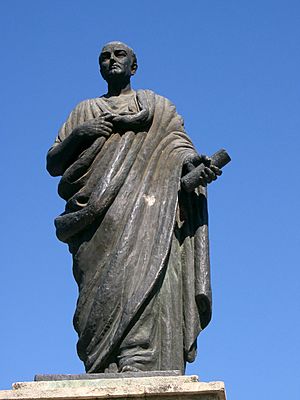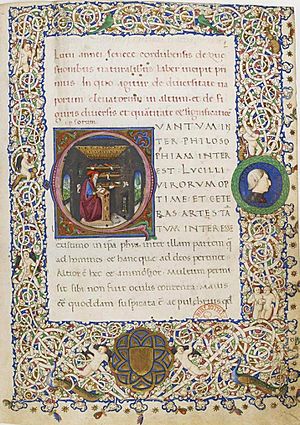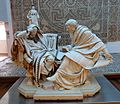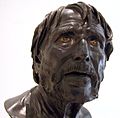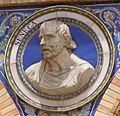Seneca the Younger facts for kids
Quick facts for kids
Seneca the Younger
|
|
|---|---|
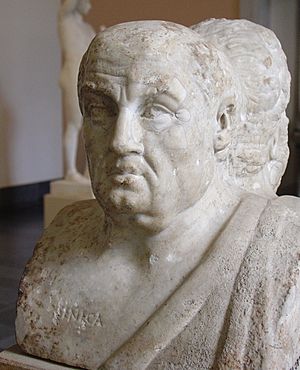
Ancient bust of Seneca, part of the Double Herm of Socrates and Seneca
|
|
| Born | c. 4 BC Córdoba, Hispania Baetica (present-day Spain)
|
| Died | AD 65 (aged 68–69) |
| Nationality | Roman |
| Other names | Seneca the Younger, Seneca |
|
Notable work
|
Epistulae Morales ad Lucilium |
| Era | Hellenistic philosophy |
| Region | Western philosophy |
| School | Stoicism |
|
Main interests
|
Ethics |
|
Notable ideas
|
Problem of evil |
|
Influences
|
|
|
Influenced
|
|
Lucius Annaeus Seneca the Younger (around 4 BC – 65 AD), often known simply as Seneca, was a very important person in Ancient Rome. He was a Stoic philosopher, which means he followed a way of thinking about how to live a good life. Seneca was also a statesman, helping to run the government, and a dramatist who wrote plays. He even wrote some funny, critical stories called satires.
Contents
Who Was Seneca? A Roman Thinker
Seneca was born in Córdoba, a city in what is now Spain. He grew up in Rome, the capital of the Roman Empire. Like other well-born Romans, he studied literature, grammar, and how to speak well in public.
Seneca came from a famous family. His father was Seneca the Elder, a well-known writer. His older brother was Lucius Junius Gallio Annaeanus, and his nephew was the poet Lucan.
Seneca's Life in Politics
In 41 AD, Seneca was sent away to the island of Corsica by Emperor Claudius. This was a kind of punishment called exile. However, he was allowed to come back in 49 AD. When he returned, he became a teacher to a young boy named Nero.
Nero later became emperor in 54 AD. Seneca then became one of Nero's most trusted advisors. For the first five years of Nero's rule, Seneca and another official named Sextus Afranius Burrus helped Nero govern Rome well.
After Burrus died in 62 AD, Seneca's influence with Nero became weaker. Seneca tried to retire from public life two times, in 62 and 64 AD, but Nero did not let him. Even so, Seneca spent less time at the emperor's court. He lived quietly in his country homes and focused on his studies. He rarely visited Rome during these years.
It was during this time that he wrote two of his most famous books. One was Naturales quaestiones, which was like an encyclopedia about the natural world. The other was his Letters to Lucilius, where he wrote down many of his philosophical ideas.
In 65 AD, Seneca was ordered to end his own life. This happened because he was thought to be involved in a plan against Emperor Nero. Many people believe he was innocent of this charge. Seneca followed the emperor's command.
Seneca's Family Life
A few weeks before he was exiled, Seneca's only son passed away. Later in his life, Seneca married a woman named Pompeia Paulina, who was younger than him.
What Did Seneca Believe? His Philosophy
Seneca is known as a very important and sometimes debated figure from ancient times. Many people call him "the world’s most interesting Stoic."
Seneca wrote many books about Stoicism, especially about how to live a good life (ethics). His essays on morals are based on Stoic ideas. Stoicism was a very popular way of thinking in Roman times. Many wealthy Romans found it helpful for guiding their actions in politics and daily life.
Seneca believed that philosophy could help heal the difficulties of life. He thought that strong, negative feelings like anger and sadness should be controlled or removed. He also wrote about being okay with having little money and using wealth wisely. He discussed the importance of being kind, showing mercy, having good friends, and helping others. Seneca believed that the universe is guided by a good plan, so people should accept whatever happens to them.
He also thought it was important to remember that everyone will die one day. He believed that people should learn to face death without fear.
Seneca's Writings and Plays
As a writer, Seneca is famous for his philosophical books and his plays. All of his plays are tragedies, which are serious dramas with sad endings.
His prose works include 12 essays and 124 letters that talk about moral issues. These writings are very important for understanding ancient Stoicism. As a playwright, his most famous tragedies include Medea, Thyestes, and Phaedra.
Seneca's Lasting Impact
Seneca's ideas and writings had a huge influence on people for many centuries. During a time called the Renaissance, he was seen as a very wise person. People admired him for his moral advice and his writing style. He was also a model for how to write plays.
Fun Facts About Seneca
- Seneca often had trouble breathing throughout his life, which was probably asthma.
- When he was in his mid-twenties, around 20 AD, he became very sick with tuberculosis.
- He lived in Egypt with his aunt for about 10 years.
- Emperor Caligula once ordered Seneca to end his own life. Caligula was upset because Seneca spoke so well in the Senate. Seneca survived only because he was very ill, and Caligula was told he would die soon anyway.
Famous Quotes from Seneca
- “All cruelty springs from weakness.”
- “Difficulties strengthen the mind, as labor does the body.”
- “As is a tale, so is life: not how long it is, but how good it is, is what matters.”
- “If a man knows not to which port he sails, no wind is favorable.”
- “It is the power of the mind to be unconquerable.”
- “Associate with people who are likely to improve you.”
- “Only time can heal what reason cannot.”
Images for kids
-
Nero and Seneca, by Eduardo Barrón (1904). Museo del Prado
-
The "Pseudo-Seneca", a Roman bust found at Herculaneum, once thought to be Seneca. Now commonly identified as Hesiod
-
Baroque marble imaginary portrait bust of Seneca, by an anonymous sculptor of the 17th century. Museo del Prado
See also
 In Spanish: Séneca para niños
In Spanish: Séneca para niños
 | Roy Wilkins |
 | John Lewis |
 | Linda Carol Brown |


